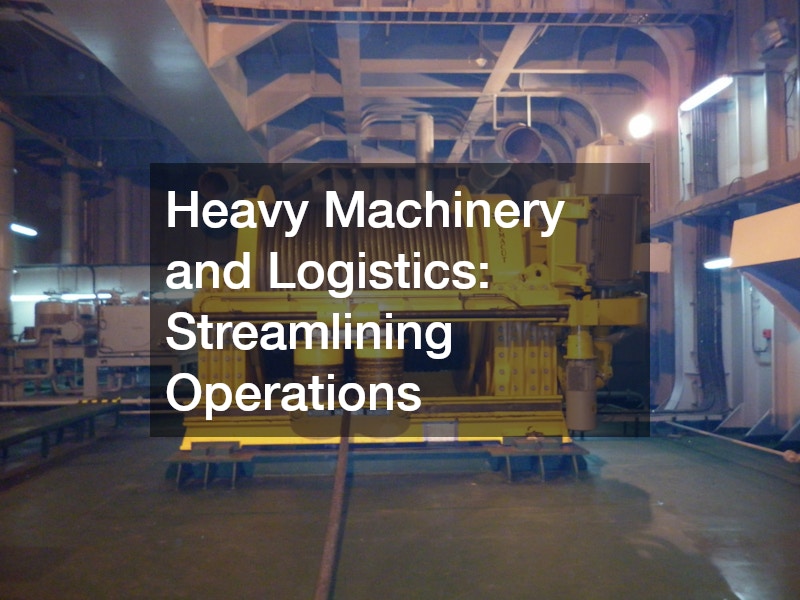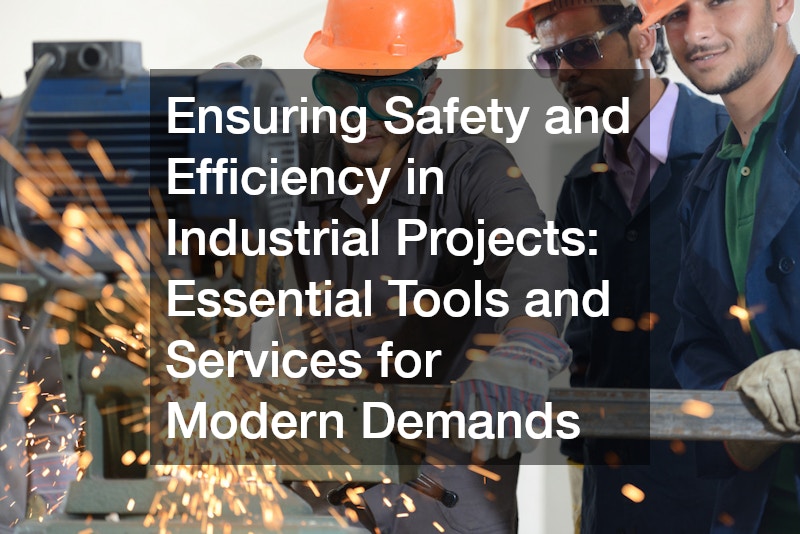The complexity of industrial project management continues to increase, necessitating the use of advanced strategies to meet the growing demands for safety and efficiency. Modern projects are multifaceted and require not only a thorough understanding of technical specifications but also a cohesive approach to managing multiple operations.
Integrating reliable tools and professional services seamlessly is crucial to ensure that industrial projects remain aligned with industry standards. This approach helps maintain safety, efficiency, and sustainability throughout the project lifecycle, contributing directly to the project’s success. By prioritising these elements, businesses can optimise resources and achieve better results.
Laying the Foundation: Pre-Construction Services
Pre-construction planning is vital for the success of any project, whether industrial or commercial. Site analysis is the first step in ensuring that a project is feasible. Professionals assess environmental factors, soil conditions, and regulatory compliance to ensure that all aspects of the project meet local guidelines. Engineering firms play a significant role in this phase by providing detailed assessments and collaborating with architectural firms to design structures that balance functionality with aesthetics.
Excavators are essential in preparing construction sites. They clear the land, dig foundations, and address drainage needs, ensuring that the site is stable and capable of supporting the proposed structure. Proper site preparation is key to preventing issues like uneven settlement and minimising delays. By investing in comprehensive pre-construction services, businesses can ensure smoother transitions from planning to execution, reducing costs and enhancing the overall safety and efficiency of the project.
Site Analysis and Planning

Experienced professionals are crucial in the site analysis and planning phase, ensuring that every aspect of the project complies with safety and environmental regulations. Their expertise in assessing the site ensures that industrial projects start with a solid foundation, reducing the risk of complications down the line.
Companies offering engineering services can provide valuable input during the pre-construction phase, offering accurate calculations, ensuring structural integrity, and identifying potential issues before they arise. This proactive approach helps businesses mitigate risks and improve the overall feasibility of the project, contributing to its long-term success.
Design and Architecture
A reputable architecture firm can create designs tailored to meet the specific goals of your project. Their collaboration with engineering teams ensures that the designs not only meet aesthetic expectations but also adhere to practical considerations, such as structural stability and environmental factors.
Achieving synergy between design and function is essential. By adopting a structured planning approach, businesses can align the vision of the project with its technical specifications, ensuring that the project is executed smoothly and efficiently from start to finish.
Excavation & Site Preparation
Excavation contractors play an essential role in preparing construction sites for industrial projects. Their expertise in land preparation directly impacts the timeliness of project completion. Excavators clear land, level the ground, and ensure that the foundation is stable, minimising the potential for delays and ensuring a solid base for construction.
Excavation is not just important for keeping a project on schedule but also for ensuring the structural integrity of the final building. Effective site preparation lays the groundwork for a durable, long-lasting structure, making it an indispensable part of industrial project management.
Heavy Machinery and Logistics: Streamlining Operations

The successful execution of industrial projects relies on efficient heavy machinery and logistics services. With flexible rental options, businesses can scale operations to suit the specific needs of each project without the burden of long-term equipment ownership. Excavator rental, for example, provides businesses with reliable and well-maintained equipment for tasks like digging, grading, or site preparation.
Transporting heavy machinery and materials is also a key logistical challenge. Professional hauling services ensure the safe and timely transport of large equipment and materials, reducing the risk of delays and potential damage during transit. By leveraging these services, businesses can maximise resource allocation, minimise downtime, and maintain project timelines, all of which contribute to the overall success of the project.
Renting Equipment for Flexibility
Renting heavy machinery, such as excavators, provides businesses with flexibility without the long-term commitment of owning the equipment. This is particularly beneficial for industrial project management, where equipment needs can change frequently, depending on the scope of the project.
Rental services ensure that businesses have access to the right equipment for their specific needs, improving project efficiency. By renting, companies can avoid the costs of ownership and make more strategic decisions, ensuring that equipment contributes to the success of the project.
Transport and Hauling Services
Efficient transport and hauling services are vital for the smooth flow of industrial projects. The careful planning of logistics ensures that materials and machinery are transported safely across the site, helping to prevent delays and optimise resource allocation.
Coordinating the transport of materials with the overall construction timeline ensures that the project remains on track. A streamlined logistics plan helps maintain momentum, preventing bottlenecks and ensuring that construction proceeds efficiently from one phase to the next.
Building Structures: Precision and Safety
The construction of durable, efficient structures is a critical aspect of both commercial and industrial projects. Commercial roofing systems, for example, protect against the harsh elements while enhancing the building’s structural stability and energy efficiency. Working with roofing professionals ensures that the installation and maintenance of these systems meet high-quality standards, minimising the need for costly repairs in the future.
The use of CNC machine services for the precise manufacture of structural components is essential for maintaining high standards of quality and safety. CNC machining ensures that components are produced to exact specifications, minimising material waste and errors, and helping to create reliable and durable structures that stand the test of time.
Structural Stability and Roofing
Commercial roofing systems are integral to industrial projects. They provide vital protection against environmental elements and contribute significantly to the stability of the structure. The insulation and durability of roofing materials play a crucial role in improving energy efficiency and overall building longevity.
Investing in quality roofing solutions offers long-term benefits, including reduced maintenance needs and enhanced safety. These advantages contribute to both the sustainability of the industrial project and the building’s ongoing operational efficiency.
Precision Manufacturing for Components
CNC machine services are invaluable for producing custom components with high precision. These services minimise errors, reduce waste, and ensure that all parts meet exact project specifications.
Using CNC machine services in industrial project management ensures that all components adhere to strict quality standards, maintaining the integrity and safety of the project. The precision and consistency provided by CNC machining play a key role in delivering high-quality results.
Safety First: Ensuring Compliance and Risk Mitigation
In industrial projects, safety is a top priority, as the risks involved can affect both workers and project timelines. Fall protection systems that comply with safety regulations are essential for protecting workers at heights. These systems, which include harnesses and guardrails, help reduce the risk of accidents and ensure compliance with safety standards.
Engineering companies play a vital role in identifying and mitigating potential risks. Regular safety training and strict adherence to safety protocols ensure that workers are prepared to handle equipment safely, which contributes to a safer, more efficient work environment. By prioritising safety and risk mitigation, businesses can reduce accidents, increase productivity, and foster trust between all project stakeholders.
Workplace Safety Standards
Incorporating fall protection systems that comply with Australian safety regulations is crucial for reducing workplace accidents, particularly when working at heights. These measures help create a safer environment and prevent incidents that could disrupt the project.
Implementing stringent safety protocols, such as regular inspections and the use of proper safety equipment, is essential for maintaining compliance with workplace standards. These safety measures ensure that workers remain protected throughout the project, contributing to a safer, more productive worksite.
Professional Oversight & Training
Engineering companies provide essential oversight throughout the lifecycle of industrial projects. Their expertise ensures that all safety standards are met and that potential risks are proactively addressed.
Training programs equip workers with the skills and knowledge to implement safety practices effectively, ensuring that they understand the risks involved and how to mitigate them. By empowering the workforce, businesses can foster a culture of safety and responsibility, reducing the likelihood of accidents and ensuring smooth project execution.
Post-Construction Cleanup and Maintenance
After the completion of industrial projects, it’s essential to clean and maintain the site to ensure a smooth transition to operational use. Dumpster rental services provide an efficient solution for collecting and disposing of construction waste, helping to keep the site clean and compliant with environmental regulations.
Cleaning services, such as commercial carpet cleaning, help restore the professional appearance of the site by removing dust, stains, and debris. This final touch enhances the presentation of the space, ensuring it’s ready for client use. Routine maintenance, such as inspections and touch-ups, also helps extend the life of the facility and ensures long-term functionality.
Debris Management
Dumpster rental services are essential for effective post-construction debris management. These services simplify waste disposal, ensuring that industrial project sites remain organised and free of clutter, which can improve both safety and efficiency.
By implementing environmentally friendly waste management practices, businesses can ensure regulatory compliance and contribute to the sustainability of the project. These practices help create a cleaner, safer worksite and are an important part of maintaining the project’s integrity.
Cleaning Services
Cleaning services play a critical role in ensuring a professional and polished finish to industrial projects. Commercial carpet cleaning, for example, removes construction dust and debris, helping to restore the site to its original condition.
These cleaning services are essential to the final stages of industrial project management. They add the finishing touch to the project, ensuring that the completed site is ready for operation and meets the standards expected by clients and stakeholders.
Enhancing Project Efficiency with Expert Collaboration
Successful industrial and commercial projects require effective collaboration between key stakeholders. To ensure that all aspects of a project are aligned and moving forward efficiently, architects, engineers, and contractors need to work together seamlessly. Regular updates and open communication channels help identify potential issues quickly, preventing costly delays.
Utilising advanced project management tools can help streamline coordination, providing real-time updates, task tracking, and enhancing transparency. These tools improve accountability, ensure efficient resource allocation, and increase the likelihood of successful project completion.
Team Coordination & Communication
Effective coordination between architecture firms, engineers, and contractors is essential for ensuring the success of industrial projects. By aligning their goals, timelines, and resources, all parties can work together to complete the project on time and within budget.
Regular communication and collaboration ensure that issues are addressed swiftly and that the project remains on track. This coordinated approach helps minimise disruptions and optimises efficiency throughout the project’s lifecycle.
Leveraging Technology for Better Outcomes
Technological advancements, such as CNC machines and automated safety tools, play a critical role in increasing efficiency and improving project outcomes. These tools contribute to higher levels of accuracy, safety, and productivity in industrial project management.
By adopting new technologies, businesses can improve the execution and management of projects, ensuring that they meet the highest standards for quality, safety, and cost efficiency.
Long-Term Maintenance and Sustainability
For the efficiency and longevity of commercial and industrial operations, long-term maintenance is essential. Regular maintenance of key infrastructure, such as safety and roofing systems, helps to keep facilities running smoothly and avoid costly repairs.
Sustainability is also a growing concern in industrial projects. Incorporating energy-efficient solutions, such as advanced insulation and renewable energy sources, can help reduce environmental impact and operating costs. Businesses that prioritise maintenance and sustainability demonstrate a commitment to long-term success and environmental responsibility, benefiting both the project and future generations.
Roof Maintenance
Regular inspections and maintenance of commercial roofs are essential to prolonging their lifespan and maintaining the operational efficiency of industrial structures. By ensuring that roofs are well-maintained, businesses can prevent issues like leaks and structural damage.
Establishing post-project relationships with contractors for ongoing maintenance helps ensure the long-term performance of the project, contributing to both its sustainability and functionality.
Sustainability Practices for Future Projects
Integrating sustainable materials and practices throughout the project lifecycle can promote environmentally-friendly development. These practices contribute to the overall sustainability of industrial projects, ensuring that they are not only cost-effective but also environmentally responsible.
By adopting green building practices and sustainable materials, businesses can create projects that meet the growing demand for eco-friendly solutions, while also setting a foundation for future success.
Conclusion
In an industry where project management is continuously evolving, incorporating the right tools and services is key to achieving successful outcomes. To meet the needs of modern industrial projects, businesses require specialised services, from excavation to long-term maintenance.
Collaboration between service providers enhances project effectiveness, fosters innovation, and improves safety and precision, all of which are critical to the success of any industrial project. By prioritising safety, innovation, and best management practices, businesses can ensure sustainable growth and lay the foundation for future industrial project success.
